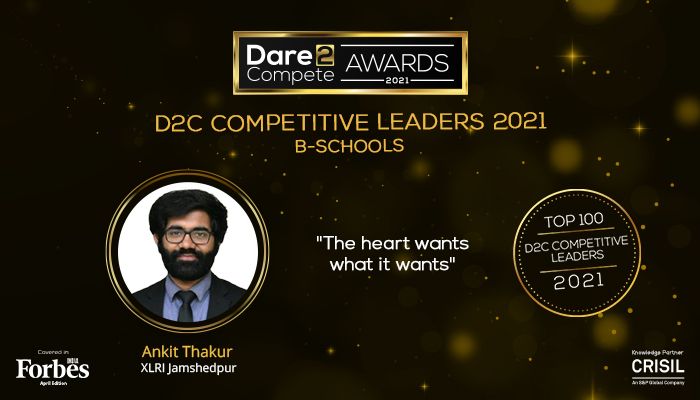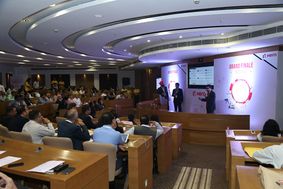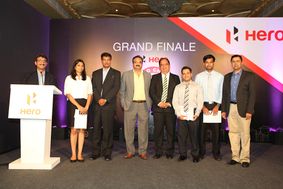A must-read! D2C Competitive Leader from XLRI shares everything about MBA and competitions (Part I)

‘The only way to do great work is to love what you do’- Steve Jobs
For me, nothing could be truer than this statement to describe my tryst with the business case study competitions.
My journey with case competitions didn’t follow but instead precede my stint at XLRI. Back in 2018, an interesting thing happened. Having participated in and successfully winning a couple of competitions at premier institutes with my teammate, we decided to participate in some competitions at the annual fest of IIT-Roorkee. While we came third in the competition we worked hardest for i.e., ‘Glocalization’, centered around Indian Aviation Sector, it was a pretty surprise when we came first in a competition called ‘Addicted’, an HR case based on an IT company.
And a year later, when my journey at XLRI started with a specialization in HR, I couldn’t be more excited for the opportunities that being part of an esteemed institute like XLRI would provide me in terms of connecting with India’s top corporates for their flagship events.
The game is all about setting the priorities right
The most important thing while pursuing masters from any of India’s tier-I B-Schools is to ‘prioritize’, especially in the first 3-4 months since that’s the most stressful time encompassing settling to the academic rigor, preparing for summer placements, committee selections, and the constant yearning for a great CV.
This is the duration where the students have the choice to start focussing upon securing top grades, making the best academic projects, working on interesting live projects, ace case competitions to gain PPI, or build other credentials in the domain of extra-curricular domain. Since I had been reading newspapers and business magazines for the past eleven years, the natural choice for me was to focus on case study competitions.
Do not take pot luck, choose competitions wisely
The initial phase was tough as in the first year, the competition from second-year students is fierce since they have already adapted to face the rigor of B-School along with grasping a decent understanding of business frameworks, presentation skills, and effective problem-solving attitude. And those not having PPOs have added incentive to escape the dreaded placements season if they secure a PPO from case comps. Also, it was the time when plenty of case competitions were being launched at the same time as either the flagship corporate competitions or as a part of summer placement outreach programs. Thus, choosing the right ones to participate in was further important.
Not every case competition is the same in terms of skills required. While some are more focused on creativity and innovation requiring skills like design thinking, others need deeper research and market understanding to build a scalable business model. And this is where the role of the team becomes extremely critical and I was fortunate enough to have an amazingly talented team.
The path to success is a bumpy ride
Due to the back-to-back hectic schedule of the initial months, I couldn’t even submit the entries for my first two case comps despite working a lot on both the problem statements. However, when another opportunity came by one of India’s leading FMCG brands with their flagship competition, my team gave our best and submitted the PPT. When first stage results were announced, we were happy to be among the only two teams from the first year who did qualify (and earned our first CV point).
Excited and happy with this small success, we gave even more time and heart to the PPT for the second round, going deeper with research, brainstorming all the ideas to finally design the entire business plan and submit our presentation. When the results were announced, we didn’t make it. For some moments it hurt, but then we realized the knowledge we had gained about the sector and industry while working on the problem. And in all my experience, that has been my biggest reward.
Whenever someone has approached me asking how to proceed ahead with case competitions, my only answer is to first understand the industry completely and read as much about the latest trends as one can. If not successful in the case competition, it definitely leaves a person more enriched in terms of industrial knowledge.
Buckle up and hold on...
Having been rejected by all the formal committees in XLRI, not scored great enough in academics, and missing on the coveted consult shortlists, like many others, I also faced a moment where things weren’t going my way at all. But then, this is what a B-School does to you, it makes you resilient mirroring the famous quote ‘What doesn’t kill you, makes you stronger.’
Thus, not bogged down by any of the setbacks, I continued participating in a lot of extracurricular events like article writing, debates, and of course, the case competitions. And finally, we achieved success in two case competitions just days before the summer internship program (SIP). One was based on ‘Top 3 Priorities of CHRO’ while another was a ‘Market-Entry case for a European Multiplex Chain in India’ by a consulting firm.
During SIP, I only had 3 case competitions in my CV along with other extra-curricular points, but I carried the self-confidence of knowing ‘current affairs’ of industries like FMCG, Banking, IT, Retail, etc. Thus, it helped a lot when I could talk of each company’s flagship initiatives and successful programs during the interview indicating the depth of research I had put in for the respective industry and its domains. And finally, I ended up securing my dream internship at the FMCG organization which had provided me with my first CV point (and fortunately offered the highest stipend for HR).
What happened post-SIP selection, turned the world upside down! Read part II to discover how the case competitions shaped things up for me. Also do not miss the tips for cracking case competitions!
To catch up on the latest articles, read:
- Looking beyond IIMs? These factors can help you choose your B-School
- MBA scholarships from IIMs and other top B-Schools
- How Nina Lekhi built Baggit from a 7k business to a 111 crore venture?
- Meet the big players produced by the CEO Factory - JBIMS
- The Man who quit his job at Google and created ‘WWW’
Login to continue reading
And access exclusive content, personalized recommendations, and career-boosting opportunities.














Comments
Add comment